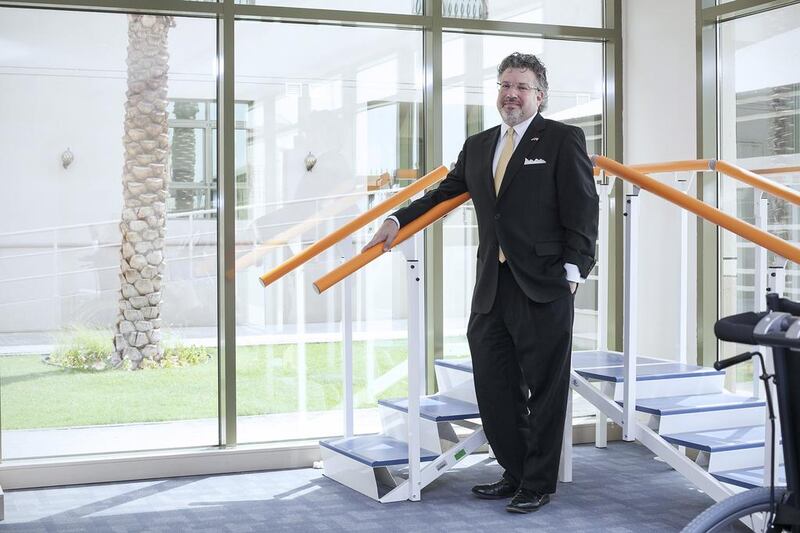The enormous growth potential of the healthcare industry in the UAE and the wider GCC region has been well documented.
The country's rapidly growing population, coupled with the government's encouragement of private-sector healthcare providers, means that there are many opportunities for entrepreneurs across the sector.
Until recently, however, the expansion of private health care has been largely confined to large hospitals specialising in acute care and polyclinics, with relatively little growth in areas such as post-acute and longer- term care, such as post-surgery rehabilitation and occupational therapy.
Cambridge Medical and Rehabilitation Center (CMRC) is one of a handful of companies that have recently sought to fill such a gap, offering rehabilitation and long-term care solutions on an in-patient and out-patient basis, taking the pressure off acute-care hospitals.
__________
Free advertisement
■ For SMEs who want to place an ad free of charge visit: https://www.thenationalnews.com/small-business-ads
__________
CMRC, which operates two healthcare centres in Abu Dhabi, caters to a range of patients including road traffic victims, children with serious birth defects, and stroke victims.
“Long-term care has been a bedrock on the continuum of care in western countries for the past 30 to 40 years, where patients are discharged from hospital but are not ready to go home, and they go to places called skilled nursing facilities or long-term acute-care hospitals,” says Dr Howard Podolsky, CMRC’s chief executive.
“Here by contrast, patients who need long-term care have traditionally stayed in an acute-care hospital where they’ve been treated and really don’t receive any long-term care. They’re just there in a hospital bed. They’re not ready to go home or they can’t go home for a variety of clinical reasons.
“What we do is take these patients who are blocking acute-care beds and bring them to our facility and care for them on a long-term basis or until such time they can be safely discharged into the home environment with home health care or with out-patient follow-up.”
CMRC’s origins are indicative of the UAE healthcare sector’s growth potential, as well as the forces driving that growth.
Far from a mom-and-pop start-up, the idea for the company came from the Dubai-based venture capitalists TVM Capital, which had invested in the local home healthcare provider Provita. The company is also backed by Olayan Group of Saudi Arabia, as well as Sharjah’s Al Zarooni Emirates Investments.
CMRC opened the doors of its first 90-bed centre in Khalifa City B in June last year.
Its second centre, in Al Ain, opened in April with an initial capacity of 45 beds, with a further 45 beds in the second phase due to be available in December.
Dr Podolsky says that a crucial early obstacle to overcome is to ensure that the right insurance reimbursement schemes are in place for rehabilitation care, to ensure that the centre can attract proper revenue streams.
“Until relatively recently there wasn’t an insurance reimbursement mechanism in place to make a business case for such a service,” he says.
“There was definitely a niche to be filled from a clinical standpoint, but without that financial model we weren’t able to attract investors.
“Now, however, with the advent of Daman and their maturity we have a reimbursement mechanism that we’ve been able to fashion a very viable business model around.”
CMRC has provided treatment to 106 patients at its two centres since its launch last year.
Dr Podolsky declined to provide details about CMRC’s revenues, but says that the company expects to enjoy annual profits from next year onwards.
CMRC is looking to open its first centre in Dubai – in Dubai Healthcare City or its vicinity – within the coming year, and is looking at opportunities to offer care in the Northern Emirates from either Sharjah or Fujairah.
The company is also planning to establish more healthcare centres across the GCC, with an initial emphasis on Qatar and Saudi Arabia.
Such growth prospects inevitably make CMRC a prospect for acquisition by a larger healthcare provider. Dr Podolsky says that such a move is inevitable for the company, given TVM’s strategy of seeding and funding growth companies before selling them.
Last month, TVM sold its equity in Provita, CMRC’s sister company, for US$160.6 million to Abu Dhabi’s NMC Healthcare.
Dr Podolsky declined to say whether CMRC was also up for sale during the discussions between NMC and TVM, and whether TVM has entertained other offers for the company before or since.
In parallel with efforts to educate patients about the advantages of post acute rehabilitation care, CMRC has been talking to healthcare regulators.
“The regulators we deal with are very supportive, but they’re more geared towards dealing with traditional areas of focus like-acute care hospitals and polyclinics,” says Dr Podolsky.
“There’s a fair bit of bureaucracy that we need to navigate on a day-by-day basis, whether its license or regulatory issues that are complex and haven’t been designed to cope with the sophistication of post acute care.
“So we’ve had to take time to educate regulators as to what post acute care really is and what should and shouldn’t be part of our regulatory framework. For example, why we don’t need an emergency room, or an operating facility for surgery. It’s an ongoing process that can take a lot of time and effort.”
jeverington@thenational.ae
We are on the lookout for SME success stories. If you want to have your business profiled, contact us at business@thenational.ae
Follow The National's Business section on Twitter





